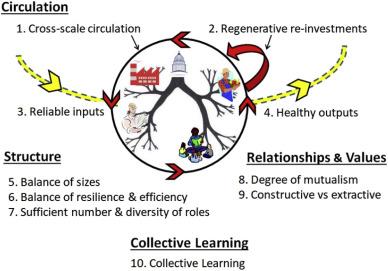Measuring regenerative economics: 10 principles and measures undergirding systemic economic health

Measuring regenerative economics: 10 principles and measures undergirding systemic economic health
Connecting regenerative principles to mainstream economic theory.
The abstract of this paper doesn't do justice to the significant effort made to build on existing economic and scientific theories to extend to additional principles and dynamics that are grounded in biology and natural systems.
Abstract: "Applying network science concepts and methods to economic systems is not a new idea. In the last few decades, however, advances in non-equilibrium thermodynamics (i.e., self-organizing, open, dissipative, far-from-equilibrium systems), and nonlinear dynamics, network science, information theory, and other mathematical approaches to complex systems have produced a new set of concepts and methods, which are powerful for understanding and predicting behavior in socio-economic systems. In several previous papers, for example, we used research from the new Energy Network Science (ENS) to show how and why systemic ecological and economic health requires a balance of efficiency and resilience be maintained within a particular a “window of vitality”. The current paper outlines the logic behind 10 principles of systemic, socio-economic health and the quantitative measures that go with them. Our particular focus is on “regenerative aspects”, i.e., the self-feeding, self-renewal, and adaptive learning processes that natural systems use to nourish their capacity to thrive for long periods of time. In socio-economic systems, we demonstrate how regenerative economics requires regular investment in human, social, natural, and physical capital. Taken as a whole, we propose these 10 metrics represent a new capacity to understand, and set better policy for solving, the entangled systemic suite of social, environmental, and economic problems now faced in industrial cultures."
By Brian D. Fath, Daniel A. Fiscus, Sally J. Goerner, Anamaria Berea, and Rober E. Ulanowicz
